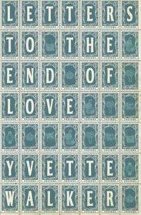Letters to the end of love by Yvette Walker

University of Queensland Press; Queensland, 2013. ISBN 9780702249662
Recommended for adults and senior secondary readers. This novel,
written in the epistolary style, tells the stories of three couples
who write to each other memorialising their lives and their loves.
Caithleen and Dmitri live in County Cork, Ireland in 1969. They have
been together for a long time but are now faced with separation.
Dmitri, a painter who escaped from the Gulag in USSR, has a
life-threatening condition and both he and Caithleen mourn a lost
baby.
Lou and Grace live in 2011, and are separated by space and grief.
Lou, a bookseller, writes from Perth to Grace who, as a 'fix-it'
woman for the famous, is travelling. The letters explain their
separation, caused in part by the death of Lou's brother in Iraq,
and eventually promise a future.
John's letters, dated 1948, are to his lover David who has not
survived the Holocaust. His letters are prompted by a visit from a
fellow inmate who met David in the camp where he was sent as a
homosexual by the Nazis, and where, presumably, he dies. John's
letters recapture his affair with David and are a memorial to their
love.
The stories are linked by references to a Paul Klee painting that
serenely surmounts human conflict and grief. The letters are all
moving in themselves and the historical backgrounds feel authentic.
However, a difficulty with the epistolary form lies in the
introduction of other characters. How to explain these people to the
reader in a letter to someone who must know them perfectly well?
Also, unfortunately, the frequent expressions of love and regret
tend to wear thin at times. The story of Caithleen and Dimtri is the
most convincing and is beautifully written, the descriptions of the
bay and village where they live being immediate and vivid. The book
is recommended for adults and senior readers.
Jenny Hamilton